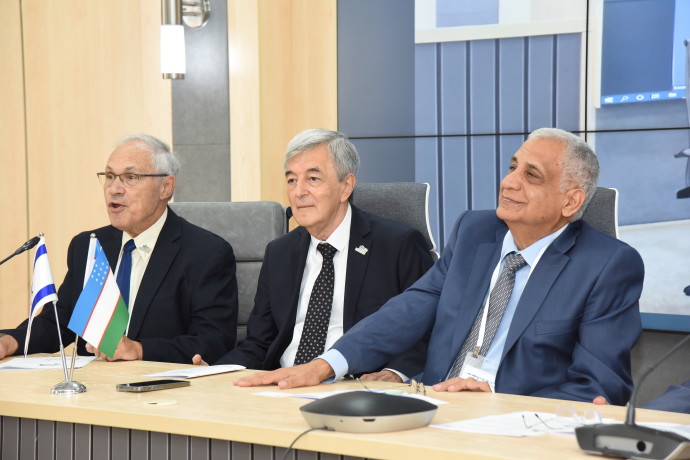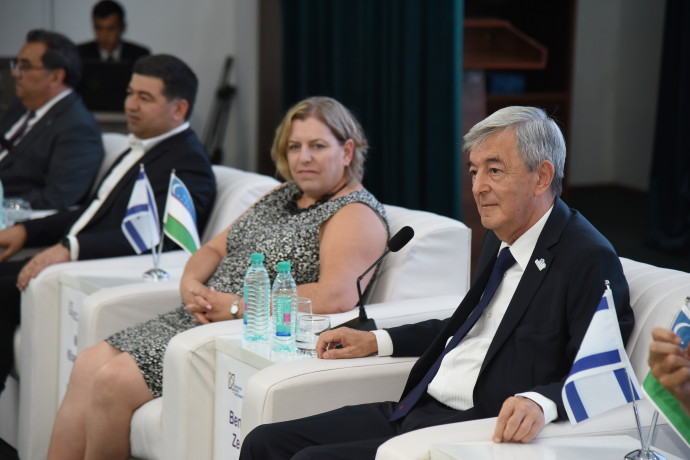The high-speed Uzbekistan Railways train from Tashkent, capital of Uzbekistan, rapidly traverses the brown foothills of northeast Uzbekistan, arriving in the 2,000-year-old city of Bukhara, once a prominent stop on the ancient Silk Road.
Disembarking from the train into the warm late-summer sun, together with a delegation from the Holon Institute of Technology (HIT), we are greeted by a group of serenading musicians playing the karnay, a long wind instrument, as we enter the city’s train station.
In early September, this reporter accompanied a distinguished group organized by the institute, one of Israel’s top hi-tech academic institutions, to Uzbekistan for the Israel-Uzbekistan International Summit of Academy and Science, held in Tashkent, Bukhara and Samarkand. The conference also featured a STEM^2 Conference, bringing together senior representatives from academia, industry and society from Israel, the UAE and Central Asian countries with senior Uzbek representatives in innovation, academia, industry, health and tourism.

Our arrival in Bukhara for the opening of the STEM^2 Conference at Bukhara State University warranted the musical welcome at the train station.
The HIT contingent was headed by Prof. Eduard Yakubov, president of HIT. During the seven-day visit, Yakubov and other HIT officials met with leading academics, government officials, diplomats and university heads in an effort to increase cooperation between Israeli and Uzbek institutions of higher learning.
‘As a son of both Uzbekistan and Israel, I am trying to build bridges between the two countries’
Throughout our visit and the various sessions and meetings, one sensed the spirit of collaboration between the Israeli group and its Uzbek counterpart. Yakubov was especially grateful for the assistance and participation of Uzbekistan’s ambassador to Israel, Feruza Makhmudova, in the conference.
The warm feelings between Uzbekistan and the Jewish people date back thousands of years, when Jews first arrived in Bukhara after the destruction of the First Temple. During World War II, Uzbekistan became a refuge for Jews and others fleeing Nazi persecution. More than one million refugees, including hundreds of thousands of Jews, escaped to Uzbekistan.

Addressing the opening conference in Tashkent, Israeli Ambassador Zehavit Ben-Hillel noted the importance of the ties being created between the two countries in science and technology.
“This conference is yet another sign of the developing relations between Israel and Uzbekistan. Connections [in] academia, research and business strengthen the closeness between the countries,” she said.
On a recent afternoon, I met with Yakubov in his office on the HIT campus to discuss the Uzbekistan conference and his plans for academic cooperation with Uzbek institutions. During the week in Uzbekistan, Yakubov was constantly on the move. Back in his office, he was relaxed and reflected on the trip’s successes.
“In addition to the focus on STEM [science, technology, engineering and mathematics], we also gave lectures on design,” says Yakubov. “Many discussions were held on this subject, along with thoughts on how to best organize joint conferences in math and science.”
'MDs in Uzbekistan have expressed great interest in HIT’S new BSc degree in digital medical technologies.'
Doctors from the Israel-based nonprofit Eye from Zion, which carries out humanitarian medical missions throughout the developing world, accompanied the HIT delegation. In cooperation with HIT, they performed free medical procedures in Bukhara and Tashkent.
Yakubov studied in Tashkent and received his academic training there. He explains that one of the primary goals of the conference was to encourage and increase joint research between Uzbekistan and the State of Israel. In addition, HIT is bringing students from Uzbekistan to its Holon campus to study.
“As a son of both Uzbekistan and Israel, I am trying to build bridges between the two countries,” he says.
In late September, shortly before Rosh Hashanah, HIT inaugurated a dormitory designed to house close to 500 students, and an initial group of students from Uzbekistan arrived on campus this month.
Yakubov met with prospective students during his visit to Uzbekistan and was deeply impressed with their deep interest in studying in Israel.
"I met many students, and they have a great motivation to learn,” he says. “A Muslim woman, who was covered entirely except for her face, was at the meeting. To my surprise, she spoke fluent English and asked me the following question: ‘Can I attend classes on your campus if I am dressed this way?’ ‘Certainly,’ I said.”
Yakubov adds that another student mentioned that he had been studying the status of hi-tech in Israel, analyzing which areas are developing most quickly.
“I want to study computer science in Israel, and I have been saving for a trip to Israel for two years,” he told Yakubov.
“Students in Uzbekistan have a great desire to study and learn,” says Yakubov. “The fact that Uzbekistan is an Islamic country does not present a barrier for them.”
He anticipates that some of the space in the school’s new dormitories will be allocated for students from India and other countries who will be studying design at HIT, while students from Uzbekistan and Azerbaijan will study computer science and mathematics.
“Having foreign students will elevate HIT to another level, not only as an institution advancing Israel’s overall international agenda but also one that particularly brings Israel closer to moderate Islamic countries, which is a key priority of our country.
“On the one hand, Uzbekistan is primarily an Islamic republic – more than 80% of the population is Muslim. But on the other hand, they prefer to join with other more moderate Muslim nations, in the way that Bahrain and the UAE have done.”
In the first years of the student exchange program, Yakubov wants to bring a small number of students from Uzbekistan to HIT – not more than 100 annually. The small initial core group, he says, will form a type of “tech elite” that will help advance the sciences in their home country.
He adds that physicians in Uzbekistan have expressed great interest in HIT’S new BSc degree in digital medical technologies.
HIT’s program is the only program in digital health offered in Israel and is one of the first programs of its kind in the world. Developed in close collaboration with Israel’s leading hospitals and health maintenance organizations, the three-year program focuses on artificial intelligence, big data, telemedicine and robotics, as well as health and medical sciences based on biology, chemistry and physics.
Yakubov says that doctors in Uzbekistan are interested in enhancing their skills in this growing area.
While more students from Uzbekistan and other countries will soon be making their way to HIT, a smaller number of Israeli students from HIT will be visiting Uzbekistan, beginning in the summer of 2023. Yakubov explains that students from HIT’s Faculty of Design will go to Uzbekistan to study architecture and the emerging field of IT tourism.
For Yakubov, the September trip to Uzbekistan was a homecoming of sorts.
“I was born in the heart of the Islamic area of Tashkent,” he says, adding that he spoke the Uzbek and Tajik languages as a child.
During his visit, Yakubov was interviewed by a local television station in Tajik and was delighted that he retained enough of the language to express himself.
What did Yakubov say in Tajik?
“I said that we must appreciate peace. Peace is an eternal value, and I know that both the Jews and the Uzbek people embrace this notion.”
On the final day of their visit, Yakubov and the HIT delegation visited a park that commemorates the Allied victory in World War II.
“We placed a bouquet of flowers on a statue honoring the Uzbek citizens who saved more than 500,000 Jews finding refuge there from Poland, Romania, Russia and other countries. We especially wanted to express our thanks.” HIT expects that its joint programs with Uzbekistan will strengthen the bonds of friendship between the two peoples.
“I have seen in my meetings with students, parents and volunteer organizations the importance they place on strengthening ties with Israel,” says Yakubov. “Our task is to build personal connections with lecturers and students and, through this cooperation, create a joint ecosystem that will enable Israel to grow in technology.”
This article was written in cooperation with the Holon Institute of Technology.
